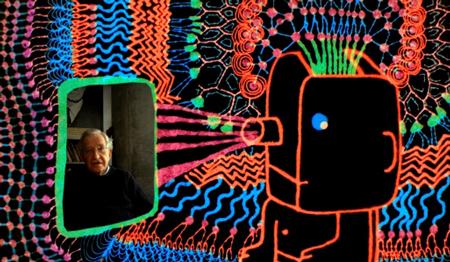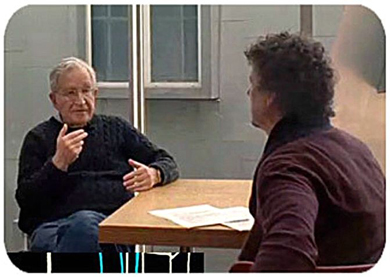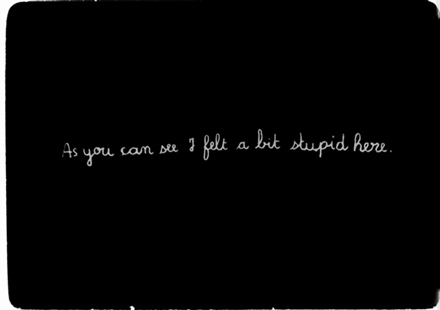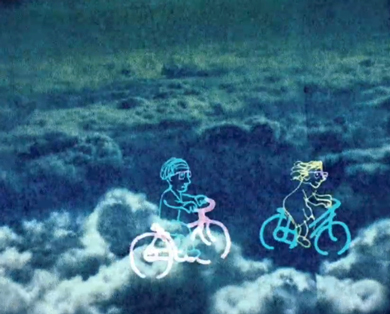Reviewed by Glenn Erickson
Noam Chomsky is best known in film circles for blistering political essays, books and videos; he's been an intellectual voice speaking truth to power since the middle 1960s. Movies promoting his political beliefs have by and large been excellent. The most famous example is still the early (1992), recommended Manufacturing Consent: Noam Chomsky and the Media.
But Chomsky's political stance has overshadowed the work of one of the brightest thinkers and communicators of our times, and an academic who reshaped the field of linguistics. A much more holistic view of Chomsky, not centering on his political controversies, is a recent film by Michel Gondry, Is the Man Who Is Tall Happy?: An Animated Conversation with Noam Chomsky. The title is as literal as a title can be.

The affable French writer and filmmaker Gondry narrates the picture when not in actual conversation with Mr. Chomsky. He begins by defining his purpose and explaining his methodology. Because any filmed visuals set against an interviewee's words will by definition reinterpret and reshape them to the filmmaker's agenda, Gondry didn't film anything special for his docu, and didn't even film all of what Chomsky says. About 98% of what we see for 89 minutes is Michel Gondry's primitive animation, illustrating as best he can what Chomsky is saying. Most of the animation is little more than ink doodles on white paper -- we can see the paper, the edges of the desktop and now and then Gondry's hand as well. The animation is lively, amusing and just vivid enough to illuminate the professor's words without overpowering them. Chomsky retains the pulpit, and what we see is an animated thought process reacting to what he says.
Every so often will appear a little inset window with a sync-sound image of Chomsky. Gondry filmed only bits of the interviews with his 16mm wind-up Bell & Howell camera. We can hear it whirring on the soundtrack. Even Chomsky asks if this is a good thing. Gondry answer is that by keeping the artifice front and center -- the acknowledgment that these are interview sessions, the transparent simplicity of the animation -- the audience will be better able to concentrate on what Chomsky has to say.
I tend to agree. My mind tended to drift with the film's information flow, rather than away from it.

Gondry's interview questions take a refreshingly biographical approach. We start with Chomsky's first memories, and build from that to learn about his childhood in an intellectual family, in an ethnically Jewish block in Philadelphia. The professor talks about a progressive school that eschewed grades and competition. Chomsky just thought he was being curious, inquiring about his father's Judaic studies, and only later discovered that people regarded him as 'smart'. His explanation of how he came to challenge the status quo in linguistics soon becomes a valuable lesson about the nature of science. It's explained that real science only began when intelligent men started asking questions about things around them that weren't normally questioned. Examples: why does a ball fall, but steam rise? Chomsky encountered the same resistance to basic questioning in academia, when he broke free of established practices in linguistics to concentrate on formulating larger theories.
That's just one of at least twenty inspiring 'lessons' imparted by Chomsky in response to Gondry's questions. We hear the professor's take on evolution ("natural selection is just one of many factors") and hear a quick run-through of some of his ideas about language acquisition in children. Gondry's persistent belief in reincarnation, he's told, links him to Plato. When Plato couldn't understand why babies seemed to already "know" so much about the world, he decided that they must be 'remembering' information from previous lives. Chomsky relates his thoughts on the way intellectual consciousness must have suddenly taken off like wildfire, as soon as primitive man evolved the mental tools to make the leap. We also hear some impressive, thoughtful ideas about the nature of religion and man's belief in the afterlife. Chomsky has a gentle and humanistic viewpoint on that.

Meanwhile, the Frenchman Gondry is carrying on a running conversation about his own travails in making the film, which requires him to concentrate on making animated drawings for the better part of two years. He doesn't censor misunderstandings, as when he can't pronounce the word 'endowment' well enough for Chomsky to understand it. Gondry also expresses some frustration when Chomsky rather abruptly dismisses him after to another verbal misunderstanding. Thanks to the miracle of animation, Gondry is able to double back and straighten out the wrinkled communications. Gondry also admits that he's working as fast as he can to finish so that Chomsky can see the film. The professor is already 85 years old, and his doctors are giving him health warnings.
The film's personal dimension is quite touching. Chomsky declines to talk about the death of his beloved wife, so Gondry redirects the conversation to their relationship, which started as "a marriage of children" and was almost always harmonious. Mia Doi Todd is heard singing "I Gave You My Home" over crude animated images of the couple riding bicycles, an effect that elicits tears. They encouraged their kids to pursue what they wanted; two became activists like their father. Chomsky remembers going to jail, and his wife returning to school to get a degree in case she had to support the family. His daughter proudly gave a show 'n' tell in her classroom: My Daddy Is In Jail.

The final episode inquires into a linguistic puzzle that throws me for a loop -- but not my linguistics-trained spouse, making me feel like a true Neanderthal. Turning the sentence "The man who is tall is happy" into a question apparently opens up a bird's nest of linguistic insights about 'generative grammar' and other concepts that sail far over my head. Gondry and Chomsky twist that one around for a couple of minutes, with the professor assuring us that it's a patently simple problem illuminating a key concept. I'll take this marvelous man's word on faith. I remember once trying to navigate a Chomsky sentence that went on for nine or ten lines of text. To my brain it seemed the most convoluted thing I'd ever read in my life, with concepts woven into ideas, all alluding to other relationships. I guess I would have done better had I been sent to that school with no grades and no competition, and had a father who encouraged me to tackle adult intellectual problems at age nine.
The movie is exhilarating, even if one's first reaction upon finishing is, "I'd better look at that again". I've seen it twice so far.
MPI & Sundance Selects' DVD of Is the Man Who Is Tall Happy? is a good color encoding of this largely do-it-yourself film project. The image is 1:78 but for almost the entire picture the screen stays at the standard 1:33 square in the middle, to better frame Gondry's animation. The audio is always clear, but English subs are accessible should Gondry's accent be too thick, or if the camera noise is a bother.
The disc comes with a making-of featurette, a couple of long-form TV interviews about the film, a Q&A from a New York screening and a trailer. The audience for Is the Man Who Is Tall Happy? may not be enormous, but most anyone who sees it will be recommending it to others.
On a scale of Excellent, Good, Fair, and Poor,
Is the Man Who Is Tall Happy? DVD
rates:
Movie: Excellent
Video: Excellent
Sound: Excellent
Supplements: Making of doc, Q&A session, Democracy Now! TV appearance, Huffington Post interview, Trailer.
Deaf and Hearing-impaired Friendly?
YES; Subtitles: English
Packaging: Keep case
Reviewed: May 26, 2014

Text © Copyright 2014 Glenn Erickson
See more exclusive reviews on the Savant Main Page.
The version of this review on the Savant main site has additional images, footnotes and credits information, and may be updated and annotated with reader input and graphics.
Return to Top of Page
|

